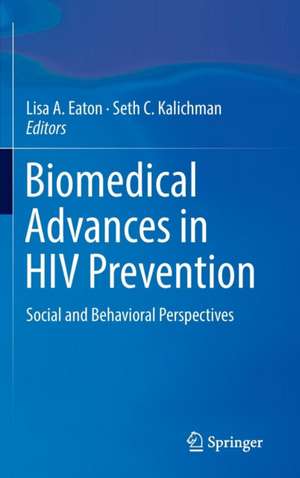Biomedical Advances in HIV Prevention: Social and Behavioral Perspectives
Editat de Lisa A. Eaton, Seth C. Kalichmanen Limba Engleză Hardback – 8 oct 2013
Lisa A. Eaton and Seth C. Kalichman, editors
Three decades into the epidemic, a great deal is known about HIV and its transmission, more people are living with the disease, and the virus is no longer seen as a death sentence. But new people continue to be infected with HIV each year, making prevention strategies that are medically effective and behaviorally engaging as urgent a priority as ever.
Biomedical Advances in HIV Prevention: Social and Behavioral Perspectives assembles the latest improvements, barriers to implementation, and possibilities for--and challenges to--future progress. Innovations such as pre-exposure prophylaxis (antiretroviral regimens for the high-risk uninfected) and treatment as prevention (early use of ART to reduce infectiousness of new patients) are examined, as are current findings on ongoing prevention and treatment concerns.
Contributors illuminate the complex realities entailing adherence, pointing out technological, behavioral, and cultural roadblocks as well as opportunities to significantly reduce infection rates. Detailed up-to-the-minute coverage includes:
- Prevention services for persons living with HIV
- Adherence to HIV treatment as prevention and pre-exposure prophylaxis
- Advocating for rectal microbicides and safe lubricants
- Mental health and substance use in the scale-up of HIV prevention
- Risk compensation in response to HIV prevention
- Implementing biomedical HIV prevention advances: reports from South Africa, Uganda, Australia, Thailand, United States, Ecuador, and Peru
| Toate formatele și edițiile | Preț | Express |
|---|---|---|
| Paperback (1) | 1093.88 lei 6-8 săpt. | |
| Springer – 22 aug 2016 | 1093.88 lei 6-8 săpt. | |
| Hardback (1) | 1100.85 lei 6-8 săpt. | |
| Springer – 8 oct 2013 | 1100.85 lei 6-8 săpt. |
Preț: 1100.85 lei
Preț vechi: 1158.79 lei
-5% Nou
Puncte Express: 1651
Preț estimativ în valută:
210.65€ • 225.26$ • 175.63£
210.65€ • 225.26$ • 175.63£
Carte tipărită la comandă
Livrare economică 18 aprilie-02 mai
Preluare comenzi: 021 569.72.76
Specificații
ISBN-13: 9781461488446
ISBN-10: 1461488443
Pagini: 288
Ilustrații: XV, 269 p. 13 illus.
Dimensiuni: 155 x 235 x 20 mm
Greutate: 0.58 kg
Ediția:2014
Editura: Springer
Colecția Springer
Locul publicării:New York, NY, United States
ISBN-10: 1461488443
Pagini: 288
Ilustrații: XV, 269 p. 13 illus.
Dimensiuni: 155 x 235 x 20 mm
Greutate: 0.58 kg
Ediția:2014
Editura: Springer
Colecția Springer
Locul publicării:New York, NY, United States
Public țintă
ResearchDescriere
Biomedical Advances in HIV Prevention: Social and Behavioral Perspectives
Lisa A. Eaton and Seth C. Kalichman, editors
Three decades into the epidemic, a great deal is known about HIV and its transmission, more people are living with the disease, and the virus is no longer seen as a death sentence. But new people continue to be infected with HIV each year, making prevention strategies that are medically effective and behaviorally engaging as urgent a priority as ever.
Biomedical Advances in HIV Prevention: Social and Behavioral Perspectives assembles the latest improvements, barriers to implementation, and possibilities for--and challenges to--future progress. Innovations such as pre-exposure prophylaxis (antiretroviral regimens for the high-risk uninfected) and treatment as prevention (early use of ART to reduce infectiousness of new patients) are examined, as are current findings on ongoing prevention and treatment concerns.
Contributors illuminate the complex realities entailing adherence, pointing out technological, behavioral, and cultural roadblocks as well as opportunities to significantly reduce infection rates. Detailed up-to-the-minute coverage includes:
Researchers, practitioners, and policy makers working in the fields of HIV/AIDS and public health will look toward Biomedical Advances in HIV Prevention: Social and Behavioral Perspectives as both a means for developing and assessing current programs and a blueprint for the next generation of prevention efforts.
Lisa A. Eaton and Seth C. Kalichman, editors
Three decades into the epidemic, a great deal is known about HIV and its transmission, more people are living with the disease, and the virus is no longer seen as a death sentence. But new people continue to be infected with HIV each year, making prevention strategies that are medically effective and behaviorally engaging as urgent a priority as ever.
Biomedical Advances in HIV Prevention: Social and Behavioral Perspectives assembles the latest improvements, barriers to implementation, and possibilities for--and challenges to--future progress. Innovations such as pre-exposure prophylaxis (antiretroviral regimens for the high-risk uninfected) and treatment as prevention (early use of ART to reduce infectiousness of new patients) are examined, as are current findings on ongoing prevention and treatment concerns.
Contributors illuminate the complex realities entailing adherence, pointing out technological, behavioral, and cultural roadblocks as well as opportunities to significantly reduce infection rates. Detailed up-to-the-minute coverage includes:
- Prevention services for persons living with HIV
- Adherence to HIV treatment as prevention and pre-exposure prophylaxis
- Advocating for rectal microbicides and safe lubricants
- Mental health and substance use in the scale-up of HIV prevention
- Risk compensation in response to HIV prevention
- Implementing biomedical HIV prevention advances: reports from South Africa, Uganda, Australia, Thailand, United States, Ecuador, and Peru
Researchers, practitioners, and policy makers working in the fields of HIV/AIDS and public health will look toward Biomedical Advances in HIV Prevention: Social and Behavioral Perspectives as both a means for developing and assessing current programs and a blueprint for the next generation of prevention efforts.
Cuprins
Part I. Advances in HIV Prevention Technologies.- Chapter 1: Advances, Promises, and Challenges in HIV Prevention.- Chapter 2: Pre-Exposure Prophylaxis.- Chapter 3: Prevention Services with Persons Living with HIV.- Chapter 4: Advocating for Rectal Microbicides and Safe Lubricants.- Part II. Behavioral Challenges and Opportunities.- Chapter 5: Adherence to HIV Treatment as Prevention and Pre-Exposure Prophylaxis.- Chapter 6: Risk Compensation in Response to HIV Prevention.- Chapter 7: Mental Health and Substance Use in the Scale Up of HIV Prevention.- Chapter 8: Substance Use Treatment in the Era of New HIV Prevention Technologies.- Part III. Global Perspectives.-Chapter 9: Revolution or evolution? What can approaches based on the use of antiretroviral drugs contribute to HIV prevention in gay communities in high-income countries?.- Chapter 10: Implementing Biomedical HIV Prevention Advances in Uganda.- Chapter 11: Implementing Biomedical HIV Prevention Advances in Thailand.- Chapter 12: Implementing Biomedical HIV Prevention Advances in Ecuador and Peru.
Recenzii
From the reviews:
“A well-qualified international panel of authors provides an update on the latest effective biomedical technologies as well as a unique focus on the psychosocial factors that undermine implementation of the biomedical advances in HIV prevention. … Students, academics, clinicians, and policymakers all will find something of relevance in this book. … Detailed tables and figures in most chapters help summarize a wealth of information. The references are extensive and up to date.” (Thomas P. Guck, Doody’s Book Reviews, March, 2014)
“A well-qualified international panel of authors provides an update on the latest effective biomedical technologies as well as a unique focus on the psychosocial factors that undermine implementation of the biomedical advances in HIV prevention. … Students, academics, clinicians, and policymakers all will find something of relevance in this book. … Detailed tables and figures in most chapters help summarize a wealth of information. The references are extensive and up to date.” (Thomas P. Guck, Doody’s Book Reviews, March, 2014)
Notă biografică
Seth C. Kalichman received his Ph.D. in Clinical-Community Psychology from the University of South Carolina in 1990. He has served on the faculties of Loyola University of Chicago, Georgia State University, and the Medical College of Wisconsin. He is currently a Professor in the Psychology Department at the University of Connecticut. He is the Director of the Social Processes of AIDS graduate training program. Dr. Kalichman has conducted AIDS prevention and treatment research since 1990 and his research has been continuously funded by the National Institutes of Health since 1994. He has published over 300 articles in peer-reviewed scientific journals, edited two books on AIDS. He dedicates his time to conducting HIV/AIDS behavioral research, focusing on developing and testing behavioral interventions to prevent the spread of HIV and minimize the adverse effects of HIV infection. He is the Director of the Southeast HIV-AIDS Research and Evaluation (SHARE) Project, community-based collaborative research group in Atlanta, Georgia and Cape Town, South Africa. He was the 1997 recipient of the Distinguished Scientific Award for Early Career Contribution to Psychology in Health, awarded by the American Psychological Association and the 2005 Distinguished Scientist Award from the Society for Behavioral Medicine. He is the Editor-in-chief of the peer-reviewed scientific journal AIDS and Behavior and the author of five books, including Denying AIDS: Conspiracy Theories, Pseudoscience, and Human Tragedy.
Textul de pe ultima copertă
Biomedical Advances in HIV Prevention: Social and Behavioral Perspectives
Lisa A. Eaton and Seth C. Kalichman, editors
Three decades into the epidemic, a great deal is known about HIV and its transmission, more people are living with the disease, and the virus is no longer seen as a death sentence. But new people continue to be infected with HIV each year, making prevention strategies that are medically effective and behaviorally engaging as urgent a priority as ever.
Biomedical Advances in HIV Prevention: Social and Behavioral Perspectives assembles the latest improvements, barriers to implementation, and possibilities for--and challenges to--future progress. Innovations such as pre-exposure prophylaxis (antiretroviral regimens for the high-risk uninfected) and treatment as prevention (early use of ART to reduce infectiousness of new patients) are examined, as are current findings on ongoing prevention and treatment concerns.
Contributors illuminate the complex realities entailing adherence, pointing out technological, behavioral, and cultural roadblocks as well as opportunities to significantly reduce infection rates. Detailed up-to-the-minute coverage includes:
Researchers, practitioners, and policy makers working in the fields of HIV/AIDS and public health will look toward Biomedical Advances in HIV Prevention: Social and Behavioral Perspectives as both a means for developing and assessing current programs and a blueprint for the next generation of prevention efforts.
Lisa A. Eaton and Seth C. Kalichman, editors
Three decades into the epidemic, a great deal is known about HIV and its transmission, more people are living with the disease, and the virus is no longer seen as a death sentence. But new people continue to be infected with HIV each year, making prevention strategies that are medically effective and behaviorally engaging as urgent a priority as ever.
Biomedical Advances in HIV Prevention: Social and Behavioral Perspectives assembles the latest improvements, barriers to implementation, and possibilities for--and challenges to--future progress. Innovations such as pre-exposure prophylaxis (antiretroviral regimens for the high-risk uninfected) and treatment as prevention (early use of ART to reduce infectiousness of new patients) are examined, as are current findings on ongoing prevention and treatment concerns.
Contributors illuminate the complex realities entailing adherence, pointing out technological, behavioral, and cultural roadblocks as well as opportunities to significantly reduce infection rates. Detailed up-to-the-minute coverage includes:
- Prevention services for persons living with HIV
- Adherence to HIV treatment as prevention and pre-exposure prophylaxis
- Advocating for rectal microbicides and safe lubricants
- Mental health and substance use in the scale-up of HIV prevention
- Risk compensation in response to HIV prevention
- Implementing biomedical HIV prevention advances: reports from South Africa, Uganda, Australia, Thailand, United States, Ecuador, and Peru
Researchers, practitioners, and policy makers working in the fields of HIV/AIDS and public health will look toward Biomedical Advances in HIV Prevention: Social and Behavioral Perspectives as both a means for developing and assessing current programs and a blueprint for the next generation of prevention efforts.
Caracteristici
Only available book focusing in the rise in importance of behavioral research in the field of HIV / AIDS prevention
Of interest to public health researchers in both biomedicine who need to understand what behavioral intervention work with specific populations
Provides professional insight into the major paradigm shift occurring in the field of HIV prevention
Includes supplementary material: sn.pub/extras
Of interest to public health researchers in both biomedicine who need to understand what behavioral intervention work with specific populations
Provides professional insight into the major paradigm shift occurring in the field of HIV prevention
Includes supplementary material: sn.pub/extras













